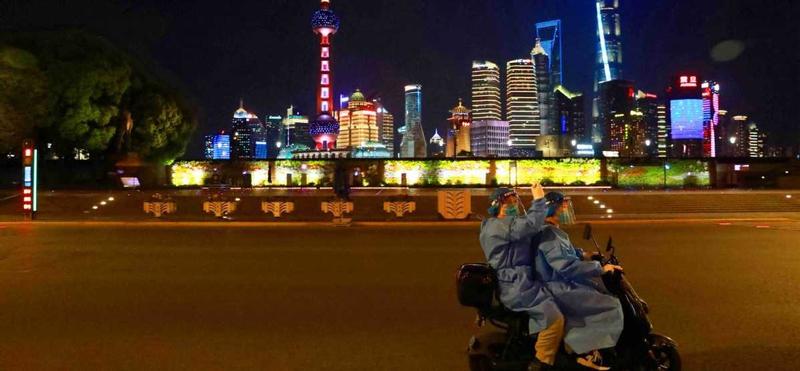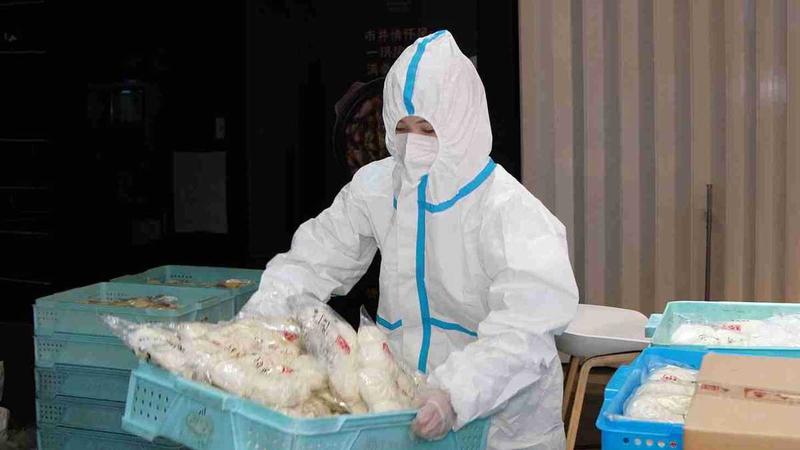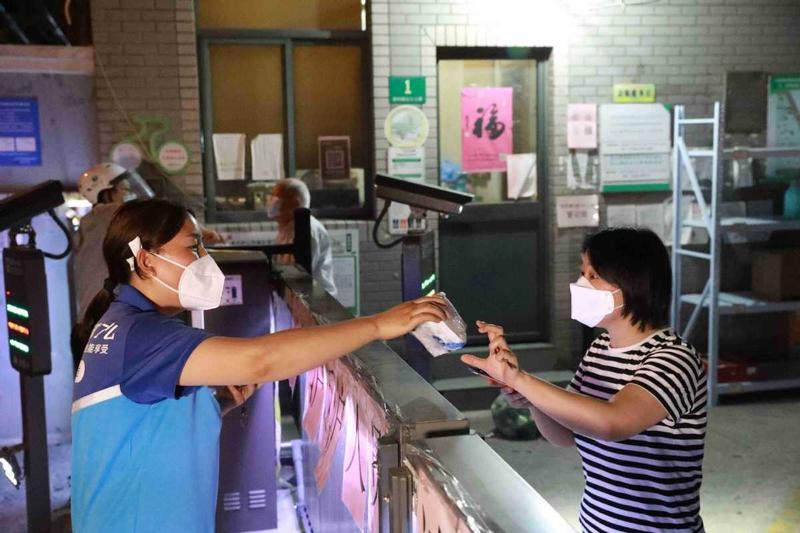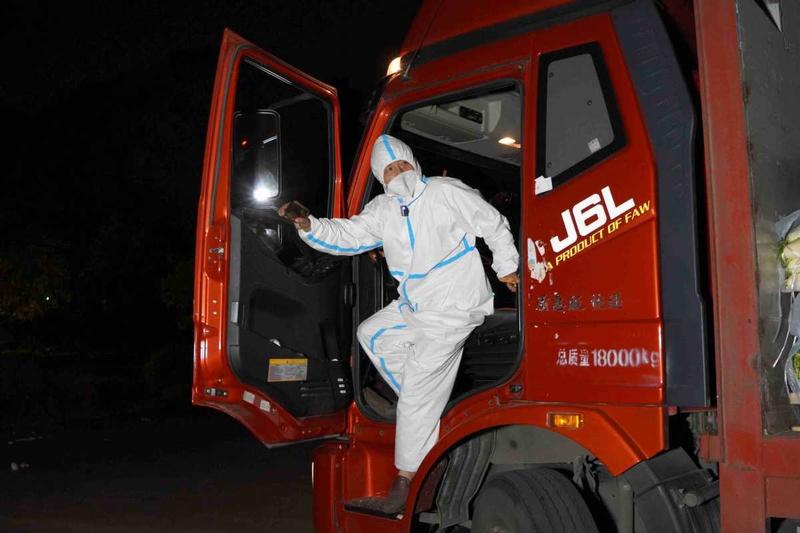 Medical workers travel along the Bund in Shanghai after finishing work late at night. (ZHU XINGXIN / CHINA DAILY)
Medical workers travel along the Bund in Shanghai after finishing work late at night. (ZHU XINGXIN / CHINA DAILY)
When most people in Shanghai, which is experiencing its worst COVID-19 outbreak since the pandemic emerged more than two years ago, are retiring for the night, others are working to keep the city running.
For example, Long Anhua, 51, delivers daily necessities to neighborhoods across Shanghai. At 10 pm on a recent evening, he had just completed deliveries of fruit and vegetables, and was awaiting further orders from Shanghai Jiaxuan Logistics, the company he works for.
With a number of local deliverymen placed under a closed-loop management system, and to make daily necessities more accessible to residents in a similar situation, e-commerce giants and logistics companies have replenished stocks and expanded their courier fleets throughout the city
He got back into his delivery vehicle after saying good night to his wife via a video call and then watched short videos she had posted.
Awaiting his next mission, Long said he had not been able to return home and had been living a nomadic life since the city was locked down at the end of last month amid a resurgence of COVID-19 cases.
To curb the fast spread of the Omicron variant, Shanghai has raced against time in the past three weeks by launching a series of efforts. Nucleic acid testing has been stepped up to cope with infections, and the construction of makeshift hospitals has been accelerated to strengthen quarantine for patients.
With a number of local deliverymen placed under a closed-loop management system, and to make daily necessities more accessible to residents in a similar situation, e-commerce giants and logistics companies have replenished stocks and expanded their courier fleets throughout the city. This means that employees such as Long have to work overtime or even through the night.
Watching the lights in nearby buildings being turned off at night and on again in the morning, Long said, "I miss my wife and children."
AALSO READ: Shanghai tackles logistics bottlenecks amid virus resurgence
The native of Hefei, Anhui province, became a truck driver after he arrived in Shanghai in 2008. Before the pandemic, his main job was to deliver automotive parts.
As volunteers at the logistics warehouse loaded Long's truck with radishes, carrots and cabbages at about 1:30 am on April 12, he ate bread in the driver's seat.
He said that in the past he finished work at about 7 pm, but during the pandemic, he does not return to the dormitory provided by the logistics' company until after midnight.
The work schedule during the outbreak also applies to other truck drivers at the company, "as we all want to deliver as many supplies as quickly as possible to residents in lockdown," Long said.
He added that as drivers are on call at night to ensure urgent deliveries are completed, eating and taking naps in the trucks have become routine.
 Ma Wanying, an employee at Shanghai Joinbuy Group, packs food on April 12 at a shop operated by the company in Jing'an district. (YANG LURONG / CHINA DAILY)
Ma Wanying, an employee at Shanghai Joinbuy Group, packs food on April 12 at a shop operated by the company in Jing'an district. (YANG LURONG / CHINA DAILY)
To ensure driving safety, Long Anhua and eight colleagues have been assigned by Shanghai Jiaxuan Logistics to take turns to work the early and late shifts, stopping for a break every few hours
To ensure driving safety, Long and eight colleagues have been assigned by the company to take turns to work the early and late shifts, stopping for a break every few hours.
As Long delivered supplies to his next destination at night on April 12, Ma Wanying, an employee at Shanghai Joinbuy Group, was packing cookies and mooncakes at a shop operated by the company in the city's Jing'an district.
Ma packed food for people in communities that were locked down, for patients in makeshift hospitals and also for medical workers from across China who are helping Shanghai fight the latest outbreak.
Wearing protective clothing, the 24-year-old packs supplies from 8 am to 2 pm every day. Sometimes she goes without water, as taking the protective gear off to go to the bathroom is not easy and slows her work.
ALSO READ: Inflatable virus test lab improves Shanghai's screening capacity
Liu Jing, head of the shop, said that before the pandemic she supervised 11 employees in making and selling about 1,200 products per day. But since late last month, she has faced a hard time with four workers in lockdown and online orders soaring.
She said that she and seven colleagues do not close the shop until they have completed some 10,000 snack orders a day. They also need to help delivery agencies load the orders at 4 am or 5 am.
Doing their best
Despite the increased workload, neither the drivers nor food shop employees have complained.
Ma said, "When I think of some residents in lockdown who do not have adequate supplies, I cannot help speeding up the packing process, because the more work I handle and the quicker I do it, the sooner they will have the food."
 Tian Dan (left) delivers medicine to a resident in Shanghai. (ZHU XINGXIN/CHINA DAILY )
Tian Dan (left) delivers medicine to a resident in Shanghai. (ZHU XINGXIN/CHINA DAILY )
Liu Jing, head of Shanghai Joinbuy Group, said that she and seven colleagues do not close the shop until they have completed some 10,000 snack orders a day. They also need to help delivery agencies load the orders at 4 am or 5 am
Tian Dan, 34, a delivery worker for Ele.me, a leading online platform for takeout services, has a similar goal. Tian has to work even quicker than Ma, as she delivers urgent supplies such as medicines and milk powder to meet specific demands across the city.
"Previously, I left work at about 7 pm, but in recent weeks I haven't finished until I have completed all the online delivery orders," she said.
The mother of two daughters, Tian added: "We can never let a baby go hungry. Deliveries of some drugs can be a matter of life or death during this difficult period, when it is hard for people in lockdown to go to a hospital."
On the evening of April 12, Tian and two colleagues completed 52 deliveries of urgent online orders. Every time she drove to a neighborhood, she left the drugs at the community gate and phoned the buyers to tell them their orders could be collected.
At about 8 pm that evening, she delivered a bag of medicines to the Shuangshan community to treat a child's asthma. After a few minutes, Zhang Qianhui, the mother of an 8-year-old boy, came to pick up the drugs.
Zhang said: "The city's Children's Hospital dispensed the medicine for my son and told him to take it to ease his asthma symptoms. I ordered the drugs online on April 8, but I wasn't sure whether they could be delivered due to the pandemic.
ALSO READ: Some Shanghai communities allowed to ease lockdowns
"If no courier accepts the order, my son will have no medicine. Previously, the delivery could be completed the day the order was placed, but this time it took four days-but that's better than having no delivery."
Tired but determined
Long, the truck driver, said he feels exhausted. "But I can carry on-it's what I should do amid the pandemic, and what I have done to date embodies my personal values," he said.
He added that he is able to persevere in the fight against COVID-19 because of his family's understanding, support and encouragement.
Recalling the day he delivered supplies to his own neighborhood, Long said: "It's hard to describe my feelings at that time. I was so close to my family members, but I couldn't touch them. It made me a little uncomfortable.
 Truck driver Long Anhua transports daily necessities to neighborhoods across the city. (YANG LURONG/CHINA DAILY)
Truck driver Long Anhua transports daily necessities to neighborhoods across the city. (YANG LURONG/CHINA DAILY)
We can never let a baby go hungry. Deliveries of some drugs can be a matter of life or death during this difficult period, when it is hard for people in lockdown to go to a hospital.
Tian Dan, delivery worker for Ele.me
"But my wife encouraged me, telling me not to worry about her and the children and also reminding me to protect myself when I made deliveries.
"From that moment on, there have been just two things on my mind-that the outbreak will end as quickly as possible and that I can soon see my family members again."
Tian, the delivery worker and mother, traveled to Shanghai because she wanted to be reunited with her husband and elder brother, who work in the city. But now the three are separated from one another in different districts.
READ MORE: Shanghai to improve case handling efficiency
After she delivered medicines on April 12 and returned to a dormitory assigned by her employer, it was nearly midnight. Opening a bowl of instant noodles for dinner, Tian read messages left by her family members and watched videos of her daughters, who are being cared for by their grandparents.
"I hope the time to be reunited with my family will come soon," she said.
Ma, the food shop employee, said she hoped the hustle and bustle of Shanghai would soon return, as she has missed the city's energy and pace of life.


